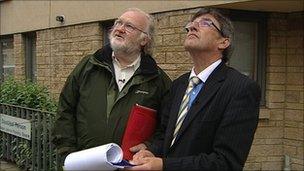Corruption claims against Edinburgh council officials
- Published
An investigation has uncovered evidence of possible fraud and serious wrongdoing in building repairs overseen by Edinburgh City Council
BBC Scotland has uncovered evidence of possible fraud and serious wrongdoing in building works overseen by Edinburgh City Council.
There are calls for a review of recent work carried out under the statutory notice system, which allows the council to order repairs to private homes.
The BBC heard claims of bribes being offered by contractors, overcharging, unnecessary and poor quality work.
The council said it would not comment until a police inquiry had ended.
Mark Turley, director of Services for communities at Edinburgh City Council, said: "The ongoing independent investigations by Deloitte and the police mean it wouldn't be appropriate for us to carry out an interview."
The fraud unit at Lothian and Borders Police is currently investigating the council's property conservation department, which deals with statutory notices.
Over the past year about 15 of its officials - nearly half the department - have been suspended in a move the council described as "precautionary". The local authority also called in Deloitte auditors to carry out an investigation, which is still ongoing.
Under the statutory notice system, the council can intervene to organise repair work for private properties when the owners cannot reach agreement.
Council surveyors arrange the work through approved contractors and recoup the cash from owners, and the local authority also receives 15% of the final bill.

Christine Foster died after she was hit by falling masonry in 2000
The value of statutory notices issued by council surveyors has increased dramatically in recent years, from £9.2m in 2005 to more than £30m in 2010.
A BBC investigation, Scotland's Property Scandal - screened at 22:35 on Tuesday on BBC1 Scotland - reveals claims of cosy relationships between contractors and council officials.
The BBC understands that police have been passed evidence claiming a council officer went on holidays paid for by a contractor.
The property conservation department's hospitality records until 2009 have now been lost.
The legislation used to issue repair orders to private homeowners is unique to Edinburgh, although councils elsewhere in Scotland can use broader housing powers to achieve similar results.
A recurring theme of the complaints from residents and businesses in Edinburgh has been spiralling costs when further repairs are carried out without owners being consulted, leaving them with bills totalling hundreds of thousands of pounds.
Poor quality
BBC Scotland commissioned two experts - quantity surveyor Gordon Murdie and structural engineer John Addison - to examine cases where work was carried out under the statutory notice system.
They concluded that the residents had been over-charged, and that some of the repairs were unnecessary, of poor quality and may actually have made the buildings worse.

The two experts said the repairs they examined were over-priced, unnecessary and of poor quality
The BBC also found evidence that the council was using firms not in their list of framework contractors, such as Action Building Contracts.
It picked up nearly £2m of work from the council over a two-year period. The firm, which later went into administration, has refused to comment.
Councillor Ewan Aitken, former leader of Edinburgh City Council, told the BBC he is contacted at least once a day by concerned constituents over statutory notices.
For the past two years he has been raising concerns on behalf of constituents. He also became worried that some contractors carrying out statutory notice work have been lining their own pockets.
And he is particularly concerned that a few council officers may have abused their powers.
'Unexplained decisions'
He said: "I am of the view that some things have gone on that have broken the law.
"I have seen what appear to be strange decisions, unexplained decisions about who gets work, and that worries me deeply. And I've been asking questions, public questions, about that, and not got answers."

Former city council leader Ewan Aitken has passed the information he has received to the police
Some residents are now contacting lawyers to determine whether the work they paid for was necessary and fairly priced. And Mr Aitken believes hundreds of cases may be invalid, resulting in a potential bill for the council of tens of millions of pounds.
He said: "I think we need to review every case, at least back to 2005, to find out how was the notice was put in place."
A council report says about 3,000 notices are issued each year, but all non-emergency cases have now been put on hold while the police and Deloitte investigations are carried out.
The statutory notice system aims to protect the rich architectural heritage of Scotland's capital, which includes a World Heritage site.
It is also intended to protect the public from defective old buildings, the importance of which was tragically borne out in June 2000, when falling masonry killed Australian waitress Christine Foster at the city's Ryan's Bar.
The council's Mr Turley added: "The fact that we commissioned Deloitte to carry out a very thorough investigation is a sign of how seriously we take the complaints and concerns that have been raised and our commitment to addressing them.
"We fully recognise that the public should know the results of these investigations and they will be reported to a meeting of the council once we are in a position to do this."
Scotland's Property Scandal will be broadcast at 22:35 on Tuesday 20 September on BBC1 Scotland, and on the iPlayer
- Published20 September 2011
- Published31 March 2011
- Published12 November 2010